Mixed Signals is Erin Straza’s weekly musing about marketing miscellany in advertising, branding, and messaging.
Humor in communication is powerful—when used correctly. In everyday conversation, we have to determine when it is appropriate to pepper our speech with sarcasm and jest. Sometimes we judge wrongly, and the timing or content of our humor is not well received.
The same happens in advertising. Marketers have to determine the appropriate time and strength of its humor so it will be well received. Sometimes they judge correctly, and other times they don’t.
I think the latter is the case for the new Got Milk? campaign, which promoted milk consumption by women as a PMS-symptom reliever. The subtitle for the print ad series summed up the claim: “Milk Can Help Reduce the Symptoms of PMS.”
But the campaign execution takes a miserable turn. The campaign is titled “Everything I Do Is Wrong” and features men looking horribly sheepish, timidly offering cartons of milk to their PMS-enraged female counterparts (who were not shown). The copy points delivered the intended humor, with titles such as, “We Can Both Blame Myself,” “I’m Sorry I Listened to What You Said and Not What You Meant,” and “I Apologize for Not Reading Between the Right Lines.” Here’s one of the print ads from the series:
Reaction to the campaign has been negative. Not surprisingly, women are complaining the loudest. They are offended by the messaging that portrays them as irrationally scary during certain times of the month—so scary that men become noodling wimps.
I winced for both women and men when I saw this campaign. The portrayal of women as irrational tyrants and men as cowering sycophants does little to turn my heart toward the product. For me as a woman, I certainly don’t want my husband cowing to my poor behavior (no matter what internal battle I’m waging). I don’t want to be placated. Sympathized and comforted, yes. Encouraged to remember the truth of God’s Word, certainly. But don’t belittle me.
Can women and men behave exactly as portrayed in this campaign? Yes. There’s no denying that reality. The campaign’s intent was to take something real and make light of it through exaggeration to draw everyone together in-perfect-harmony. But in this case, the exaggeration isn’t so funny; it’s rather painful.
The campaign has been cancelled after just a few short weeks. Sometimes what is intended to be humorous is not-so-funny after all.











